
 |
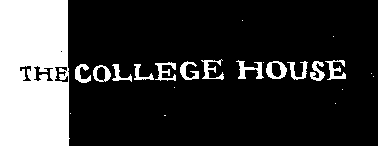 |
WE ARE LIVING IN A NEW AGE. The old world in which we have dwelt for many centuries is passing out of existence. A new world, whose nature none can now grasp, is hurling itself at us. In the midst of this, many people inside and outside the Church are being pressed to face openly and honestly the ultimate questions about the meaning of life. This is particularly true on college campuses where the mood of the time is perhaps more acutely reflected than anywhere else. THE COLLEGE HOUSE is for that awakened university student to whom the crucial questions about life's meaning, which ever lurk in the depths of our being, have been addressed in such a fashion that he can ignore them no longer.
MANY UNIVERSITY STUDENTS TODAY, selfconsciously living in the midst of the restlessness, bewilderment and turmoil of an age which has challenged our most cherished life assumptions, are searching out opportunities to wrestle in depth with the issues involved in appropriating a personal faith by which one can understand himself and render meaningful the world in which he rises.
MANY UNIVERSITY STUDENTS TODAY are no longer content with attending a university simply for the sake of fulfilling society s concept of success. They crave to be more than the embodiment of the accumulated factual information about this world, and are searching for fellowship in which to develop for themselves a selfunderstanding that wil1 enable them to forge their university studies into the kind of genuine liberal education which will make it possible to live as whole persons in the midst of society.
MANY UNIVERSITY STUDENTS TODAY are experiencing severe frustration at the point of deciding upon a life's work, and therefore are seeking a situation in which they may come to grips with the problem of selfunderstanding in relation to discovering a genuine vocation, through which they may creatively grasp and express themselves and contribute significantly to the common life of our society.
MANY UNIVERSITY STUDENTS TODAY, aware of the radical shiftings in the forms of our culture, are caught in increasing loneliness and tension in attempts to relate themselves as mature persons to their families as wel1 as to the other forms of community and areas of responsibility in society. They are therefore reaching out to understand afresh what it means to be authentically involved with other persons and to become intelligent beings in the midst of our complex social structures.
MANY UNIVERSITY STUDENTS TODAY, whether selfconsciously Christian or not, are alive to the sickness within the Church and recognize the need for informed, committed laymen in the struggle for renewal, and are therefore demanding a chance for the laity to learn to do their own theologizing, that they might find a way to participate genuinely in the mission of the Church in and to the world.
THE COLLEGE HOUSE is for these "many university students"
- it came to be and continues as a response to the needs and seekings
of the awakened university student of the twentieth century,
The Community, established in 1952, is under the
administration of an ecumenical board of directors, empowered
through a corporation charter under the laws of the State of Texas.
It is authorized as a nonprofit organization by the United
States Treasury Department.
The ecumenical, residential, coeducational,
international, and interracial program of common worship,
study, lifetogether, and mission is under the direction
of a faculty of seven theologically trained clergymen and laymen
belonging to several different denominations.
A council of outstanding laymen and clergymen, especially
qualified by their various fields and professional status, act
as advisors to the staff and board of directors.
IN HISTORY there are periods of stagnation and
periods of movement. We
are at the beginning of a
new movement period,
one of pioneering experi-
ments, for theory has got
ten ahead of the actual
state of Church life. The
Christian FaithandLife
Community is working
right at this point. This
kind of experiment is more
important than what it
does. What it is, is impor-
tant. This work is a sign,
and has far reaching im-
plications for the Church.
HansRuedi Weber,
Chairman, Dept. on the
Laity, World Council
of Churches
draws some of the very best students in the University. I have been deeply impressed by the contribution which the Community has made to the liberal education program at Texas. Although the academic standard itself is very high, the study and discussion programs have been able to move into areas where a state university would not be justified in entering. Its main characteristic has been dissatisfaction with any current accomplishment, that is the reason for its success and for my optimistic view of its future.
Dr. Harry H. Ransom, Vice President and Provost of the
University of Texas
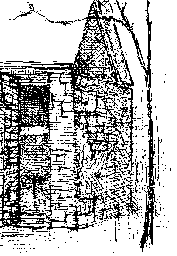 |
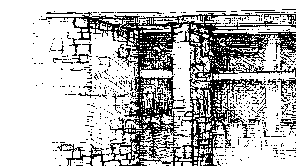 |
for application
write
director of studies
christian faithandlife community
25 l 1 rio grande, austin, texas telephone greenwood 69994
The Christian FaithandLife Community understands itself to be an experimental movement on behalf of culture and the Church. It seeks to pioneer relevant methods that will bring illumination into four pivotal areas: selfhood and common worship, selfhood and common study, selfhood and common lifetogether, and selfhood and common mission. These four focal areas embody the basic issues which claim modern man both inside and outside the Church and constitute the program of the College House.
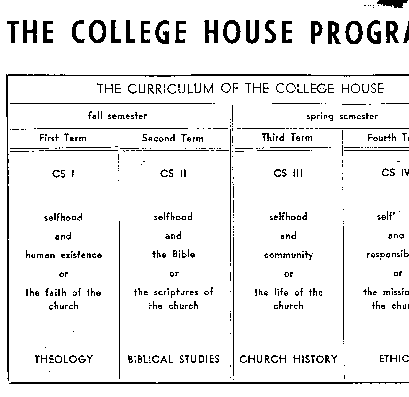 |
selfhood and symbol
THE IMMENSE ACCELERATION' of factual information during the last one hundred years has burdened contemporary man with the question of what he will use this knowledge for. This is the question of what we are willing to live and to die for. It is the question of which god we will serve, the question of the meaning of life, the question of selfhood. Furthermore, modern men are becoming newly aware that selfhood inescapably involves some kind of self-conscious participation in communal symbols through which one is enabled to grasp or become who he understands himself to be. The questions of who I am or of how I can find meaningful symbols are being grasped by college students as the questions which are prior to all of our queries about life. These issues are indications that the twentieth century is urgently involved in the problem of worship.
WORSHIP HAS ALSO BECONIE A PROBLEM in and for the Church today. She is beginning to sense that worship is her focal activity without which all her other endeavors lose their meaning, and every branch of the Church is asking anew v hat the body of believers are doing when they are engaged in the activity they call worship. This very questioning is a part of the renewal of the Church in our time.
A PRIMARY EMPHASIS OF THE COLLEGE HOE'SE IS therefore upon understanding selfhood and worship, and these are but two sides of the same coin. This concern informs and illuminates all other aspects of the program. The members both worship together and study about worship. In order to grasp the inner meaning of worship, one must participate in the activity of worship, itself, at least as an empathetic spectator. The Community therefore covenants together to gather twice daily five days a week for common worship. One service is in the morning before breakfast when the liturgies of all major communions are used in order that the student may become as are of the rich variety of expressions of Christian worship as well as the underlying unity of these services. At the close of the day, the Community's Daily Office is used. when any community, a family, a group of friends, or any other collection of individuals thrown together by whatever cause, becomes a worshipping body, they formulate over a period of time their own devotional structures. These serve for this group as long as they are gathered as this group. The Community therefore has its family devotions, or office. each evening before the common meal.
IN THIS ACTIVITY. we rehearse our consciousness of
the event that discloses the meaning of our selfhood in our finite
situation: that meaning without which men who have seen too deeply
and too much cannot live. Here, self-understanding and the symbolic
dimension of life converge as our COMMON WORSHIP.
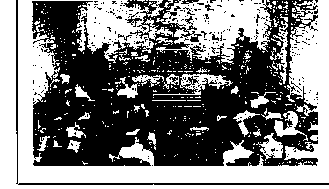 |
THE COMMUNITY'S PROGRAM includes a formal course of study roughly composed of four courses. It runs throughout the academic year and is civic The first term course raises the question of faith in the twentieth century, or as Old and New Testament understanding of human existence is analyzed. This includes a discussion of the history of the Church and the thought of the twentieth century. The course in the last term is a study of the express)
THESE STUDIES ARE UNDER THE DIRECTION of the permanent faculty of the are free of other responsibilities. In addition, on each Friday evening a questions, history, or politics is invited to speak and carry on a discussion with more fully ;shat is going on in the new world of the twentieth century, to stir courage a genuine conversation between the Church and culture.
THE THIRD AND MOST IMPORTANT ASPECT of the formal educational program is a seminar once a week at convenient hours, and critical papers are read on material in the Community serve to prime these tutorials.
FURTHER EDUCATTONAL ACTIVITIES include courses of study on a tutorial semistaff relationship plus weekly seminars for the nonresidential alumni
AS REFLECTTON IS NECESSARY TO MEANTNGFUL life, so our curriculum is essential to the total program and our mission in the world becomes
selfhood and community
COMMUNITY IS A PROBLEM in our civilization. The very structures of com neighborhoods and social groups, but in our family life as well Although very rare experience. Modern man seems either driven to the life of heroic isolation losing himself in the faceless mass of the crowd. Both are ways of death-the ~
THE CHL'RCH ITSELF IS caught in all of this and is often guilty of contri meaningful relationships with one another. Yet, the Church is being radically jud~ the world, she is rediscovering something about herself: that she is a community herself precisely what this means.
IN THE COLLEGE HOUSE, a group of university students of various social E many different courses of study, and preparing for a variety of vocations, be human beings together, to be selves in community, to be bound with out;
is that, in common living together, there may develop that kind of relation person to be who he is before him, and visa versa. One of the most significant mature, serious conversation, both in the informal giveand-take sessions.
ACCOMODATIONS APPROVED BY THE UNIVERSITY OF TEXAS are available located at 2505 Rio Grande. The women's residence is at 2401 Rio Grande. Sophomore through graduate status, whose academic standing permits, is a degree of maturity, freshmen are occasionally admitted. The basic principle
in the life and program of the College House..
THERE ARE NO TUITION CHARGES, for the program is supported by loca only for his room and board which is comparable in cost to other medium pr from campus life, but encourages and motivates them to participate fully in tl hours per week of the student's time which is, of course, in addition to his
Each student enters the College House under a moral covenant which by this, he obligates himself to participate in the total program for the year,
LIFE TOGETHER.
AUTHENTIC SELFHOOD IN CONTEMPORARY CULTURE
selfhood and reflection
THERE IS AN ALARMING DEARTH of reflective men in our society today-men who are informed on current issues at depth, who dare to think creatively for themselves, who have the courage to decide and act in the light of their convictions. This lack raises questions about our educational processes. Pressures from the cultural structures tend to force our schools to become "fact factories." Hence, too many college graduates, though high]y trained in skills, nevertheless remain uneducated and are therefore unable to contribute effectively to the common good. The desperate cry for more emphasis upon liberal education among an ever increasing number of college faculties and students must be heard. Our future depends on it.
THE CHURCH HAS A SlMlLAR PROBLEM. The religious illiteracy within the Church today is appalling. Few laymen have given, or have any opportunity to give, serious and .honest reflection to matters of faith. Yet, something is happening to the laity across the world. They are rising up to demand the chance to participate in the current theological awakening that they may discover categories adequate to articulate unto themselves and others the events in their lives, and thereby more directly contribute to the ministry of the Church in the world. This mood is at the heart of the worldwide lay movement today.
THE COLLEGE HOUSE IS COMMITTED to the principle of liberal education. It exposes the student to the atmosphere of the humanities. It helps the student develop a self-understanding to which he can meaningfully relate all the factual knowledge he possesses. It provides the chance for the kind of serious conversation through which he can learn to think critically.
THE COLLEGE HOUSE IS ALSO COMMITTED to the principle of theological education of laymen which is intimately related to liberal education. It is concerned that every Christian be able to comprehend and express his faith as one v ho lives in the 20th Century and that he be able to relate his personal and communal experience and knowledge to his faith.
The Christian FaithandLife Community offers lectures once a week late at night when the students are surer of outstanding competence in some field such as philosophy, literature, international relations students on some aspect of the growing edge of his thought. The intention here is to understand e the student to enter into the ongoing historical dialogue about man and society.
The College House is the tutorial seminar. Small groups of six or eight students meet once studied, followed by a free and rigorous discussion. All other reflective and discursive activities for Second Year Fellows (students who elect to remain in the Community an extra year in a Community who still reside in Austin.
Without COMMON STUDY our worship becomes wooden magic, our fellowship is boring busyness.
The structures of life are breaking down. This is manifest not only in our nation, our reliable institutions are substitutes for genuine community. For most people there is only loneliness, or he is forced to surrender all pretense of selfhood by humanization of man.
Here they wrestle with what it means to have a cause, to be a part of the Body of Jesus Christ. The concern of who can dare to be who he is before another, and permit the other aspects of lifetogether at the College House is the climate as it provides for the more structured discussions at the close of evening meals.
It includes both single men and wornen as well as married couples. The residence for men is ed students are housed in separate apartments. Any university student of for residence in the College House. Where there is indication of an unusual selection of members is simply the honest concern of the student to participate with churches, established foundations, and private individuals. The student pays facilities on the campus. The Community in no wise isolates its members activities from the University. The program itself requires approximately ten studies in for which he receives no academic credit. He comes by his own free decision with the other members of the fellowship. evolve himself and allow himself to be involved in the overall
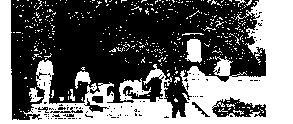 |
selfhood and responsibility
VOCATIONAL INTERESTS are urgent for today's student. He is not only asking why he should be in this or that field of study, but why he should be in college at all. In this uncertainty, he is participating in the general bewilderment of our culture about the lack of a sense of significant vocation in the world, which has issued in a host of anxieties and tensions.
The Church shares in this confusion about mission and possesses a deep feeling of guilt for her role in the establishment of the false dichotomy between faith and everyday life, between being and doing. Yet, a pivotal aspect of the renewal of the Church in our time is the present day attempt to overcome this disjunction and to recover her historical sense of radical mission in and to the world.
THE COLLEGE HOL'SE has no great wisdom and no easy answers in this area. It does offer the student the opportunity to be in the midst of, and to wrestle with, these edge-oflife questions about ``hat it means to be an authentic person with a significant task in life, or what is invoked in being a person of faith with a lifemission which underlies all of our more immediate vocations.
What does it mean to be a man, as a laboring man, a medical man, a business man? What is the meaning of faith in the midst of rearing children, selling goods, or making laws? The concern in such questions is to recapture the significance of responsible involvement and leadership in the Church and in the world.
In this sense, the total program of the College House
flows into the area of COMMON MISSION
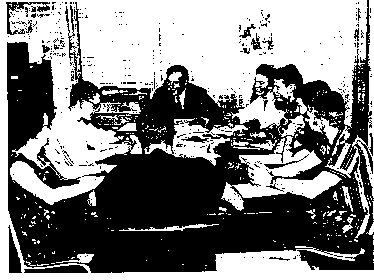 |